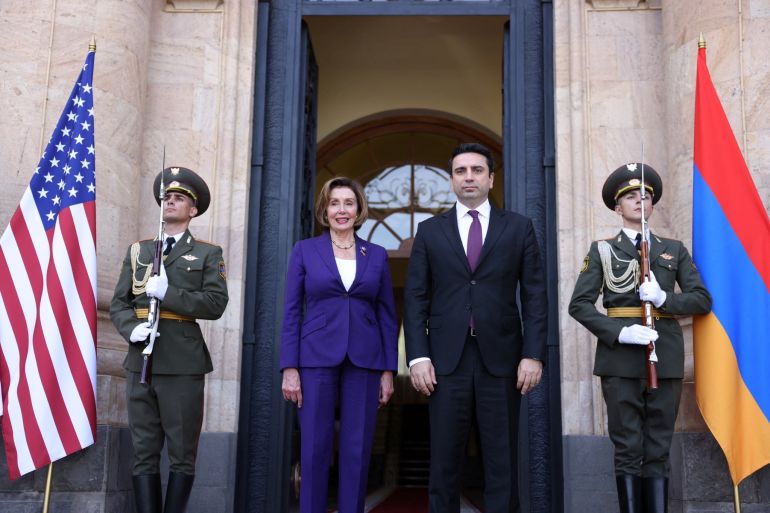Pelosi slams Azerbaijan’s ‘illegal’ attacks during Armenia visit
Azerbaijan slams Pelosi, saying the ‘unsubstantiated and unfair accusations’ are a serious blow to peace efforts.

A powerful American political figure has condemned what she said were “illegal” border attacks by Azerbaijan on Armenia, using a visit to Russia’s military ally to pledge US support.
Speaking in the capital Yerevan on Sunday, US House of Representatives Speaker Nancy Pelosi said her trip had particular importance following the “illegal and deadly attacks by Azerbaijan on Armenian territory” that led to border clashes in which more than 200 people were killed.
Keep reading
list of 4 itemsAzerbaijan-Armenia border clashes death toll surpasses 170
Armenia, Azerbaijan negotiate another ceasefire: Yerevan
What’s behind renewed fighting between Armenia and Azerbaijan?
Pelosi said it was clear the border fighting was triggered by Azeri assaults on Armenia and the chronology of the conflict should be clarified.
“We strongly condemn those attacks,” Pelosi said. “This was initiated by the Azeris and there has to be recognition of that.”
The United States, Pelosi said, was listening to Armenia about what its defence needs were and said Washington wanted to support the country in what she cast as “a global struggle between democracy and autocracy”.
Azerbaijan on Sunday scolded Pelosi for saying that Baku had started a border conflict with Armenia, saying the “unsubstantiated and unfair” remarks were a serious blow to peace efforts.
“The unsubstantiated and unfair accusations levelled by Pelosi against Azerbaijan are unacceptable,” the foreign ministry said in a statement. “Pelosi is known as a pro-Armenian politician.”
“This is a serious blow to the efforts to normalise relations between Armenia and Azerbaijan.”
US Secretary of State Antony Blinken urged Azerbaijan’s President Ilham Aliyev in a call on Sunday to keep to a ceasefire agreed with Armenia after violence.
“He (Blinken) urged President Aliyev to adhere to the ceasefire, disengage military forces, and work to resolve all outstanding issues between Armenia and Azerbaijan through peaceful negotiations,” State Department Spokesperson Ned Price said in a statement following a call between the two officials.
Pelosi also said she found it interesting that Armenia was unsatisfied with the response from the Russian-led Collective Security Treaty Organisation.
A senior Armenian official expressed unhappiness last week with the Russian-led military alliance’s response to Yerevan’s request for help.
“We are very dissatisfied of course. The expectations we had were not justified,” parliamentary speaker Alen Simonyan told national television, likening the CSTO to a pistol that did not shoot bullets, according to Interfax news agency.
Farid Shafiyev of the Center of Analysis of International Relations told Al Jazeera from the Azeri capital Baku that the reason for Pelosi’s visit was to secure American-Armenian votes to be reelected in the coming midterm elections.
“Her constituency in California is heavily influenced by Armenian votes,” he said, calling Pelosi’s trip a purely political ploy.
In the midterm elections in November, all 435 seats in the US House of Representatives and 35 of the 100 seats in the Senate will be contested.
Trading blame
An outburst of fighting between Azerbaijan and Armenia this week killed dozens of soldiers from both sides.
A ceasefire took effect on Wednesday after two days of heavy fighting that marked the largest outbreak of hostilities in nearly two years.
Over the course of the fighting, the US State Department has called for both sides to refrain from “military hostilities” and adhere to a ceasefire, stressing “there can be no military solution to this dispute”.
Armenia and Azerbaijan traded blame for the shelling, with Armenian authorities accusing Baku of unprovoked aggression and Azeri officials saying their country was responding to Armenian attacks.
The two former Soviet countries have been locked in a decades-old conflict over Nagorno-Karabakh, which is an ethnically Armenian enclave within Azerbaijan that has been under the control of ethnic Armenian forces backed by Armenia since a separatist war there ended in 1994.
During a six-week war in 2020, Azerbaijan reclaimed broad swaths of Nagorno-Karabakh and adjacent territories held by Armenian forces.
More than 6,700 people died in the fighting, which ended with a Russia-brokered peace agreement. Moscow deployed about 2,000 troops to the region to serve as peacekeepers.